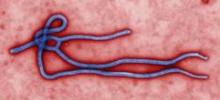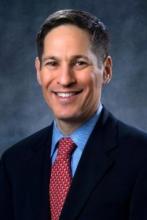Despite some signs of hope, the "window of opportunity" to contain and end the current Ebola virus outbreak in West Africa is shutting, causing the situation to worsen "significantly," according to officials at the Centers for Disease Control and Prevention.
"This is really the first epidemic of Ebola the world has ever known," Dr. Thomas Frieden, CDC director, said during a media briefing.
The prevailing belief, according to Dr. Frieden, is that the virus’s rapid spread is not due to mutation but instead to cultural and logistical obstacles.
"It’s not spreading in new ways, according to everything that we know," Dr. Frieden said. "It’s spreading through just two routes: people caring for other people ... and unsafe burial practices. ... That is really the Achilles’ heel. We know how it spreads; we know how to stop it. The challenge is to do that everywhere it is needed."
The Ebola virus is transmitted primarily through body fluids, but it also can be spread through contact with contaminated objects such as needles. Ebola is not spread through the air or by water.
Noting that rapid response is essential, and that data are lacking as to the actual numbers of those infected with the virus, Dr. Frieden outlined three key things that are needed to stem the epidemic: more resources; technical expertise in both health care management and logistics; and a coordinated global approach to ending the outbreak.
Dr. Frieden said it was a paradox that "the more the world isolates these countries, the harder it will be for them to control these outbreaks, the more cases there will be, and the less safe other countries will be. Like it or not, we’re connected."
The area currently experiencing outbreaks includes the countries of Guinea, Liberia, Sierra Leone, and Nigeria, with what Dr. Frieden said is a "dense, forested region that is the epicenter" located where the borders of all but Nigeria meet. The remote area is not serviced by radio or television and is rife with what Dr. Frieden called "misconceptions" about how the disease is transmitted.
"We can turn this around. Sometimes the problem can seem so large, it’s hard to get started, but we can chip away at the challenges, one by one," he said, inviting anyone with experience working in austere conditions, either as a health care provider or manager of an under-resourced facility, to consider volunteering his or her services, noting that the longer the crisis continues, the less stable the local communities will be.
In addition to nearly $20 million in aid from the U.S. Agency for International Development, for goods ranging from personal protection gear to resources for safer burials, the CDC will continue to support efforts by the World Health Organization (WHO) to contain the epidemic within the year, by deploying top CDC epidemic intelligence teams to help with tracking, treatment, and screening, he said.
The need for global coordination is not due to a lack of willingness from local officials and personnel to respond, according to Dr. Frieden.
"The countries are willing. In an Ebola treatment unit run by Doctors Without Borders, more than 90% of the staff are locals," Dr. Frieden said of one of the stops on his tour of West Africa. "Each of the presidents [of the affected countries] said the same thing to me: ‘Tell us what to do and we will do it. If we can’t do it, help us to do it. Teach us to care for Ebola patients and to manage the system more effectively.’ They need the world to work with them."
According to WHO, more than 1,400 patients have died of Ebola virus infection to date in this outbreak, making this the largest Ebola outbreak ever recorded. There are still "significant gaps in reporting in some intense transmission areas," and that the number of cases ultimately may top 20,000, according to WHO, which noted this outbreak has featured the infection and deaths of "an unprecedented number of health care workers."
There are no vaccines for Ebola approved by the Food and Drug Administration, although the National Institute of Allergy and Infectious Diseases currently is attempting to develop one.
As to treatments, ZMapp, a trio of monoclonal antibodies that was successfully used to treat two American health workers who were infected with Ebola, also has shown promise in a controlled trial with primates. According to ZMapp’s manufacturer, Mapp Biopharmaceuticals, the supply of the drug is currently exhausted and there is as yet no date for when more will be available.




